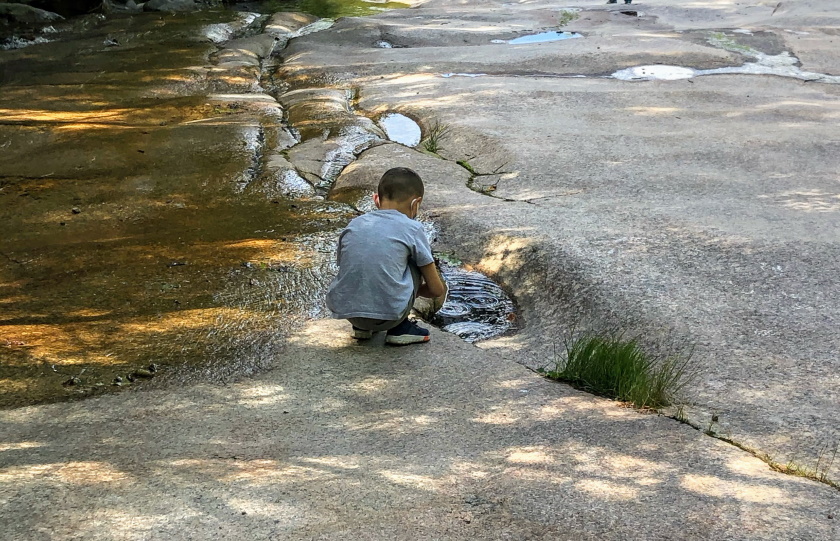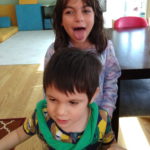
Community Submission by: Kelda York
Kelda York is married with three children and lives in NH. She is a pre-school teacher, an avid cook, and enjoys a good novel.
My son has always kept us on our toes, even before he was born. There were concerns over a heart arrhythmia, which was detected at 16 weeks of gestation. He decided to join us 6 weeks early and spent weeks in the NICU to fix some lung development issues (his heart was perfectly healthy, we found out during this time). He spent the next 6-12 months needing OT, nutritional supplements, and more focused monitoring by his pediatrician because he was a premie. This was all pretty new to me, even though he was my third child. My 2 daughters had what you would call a “normal” or “by the book” birth and development throughout their first year. Like I said, he kept us on our toes! Yet, in the grand scheme of things, I was grateful because he was healthy, happy, and any issues he encountered were easily addressed.
As he grew, he continued to be happy, healthy, and full of energy. A lot of energy. Many people would say to me, “he’s a boy, of course he has a lot of energy!” Yet, I knew this was different. At the age of 5, he was diagnosed with Attention-Deficit/Hyperactivity Disorder (ADHD), which is pretty common in children and adults. We were lucky to have a pediatrician who could identify this and work with us to find the best possible treatment.
I ignored it.
Around the same time, we started to notice eye blinking… A lot of eye blinking. It would come and go – last about a week, then disappear. Then reappear. We thought, maybe he needs his eyes checked! Maybe he needs glasses! When we asked our pediatrician about this, of course she checked his eyes – all was good there! She informed us that the eye blinking was a tic. Something he couldn’t control but pretty common in young children, especially boys, especially who also had ADHD. We didn’t think much of it. It didn’t seem to bother him. We didn’t give it any more thought.
About a year later, when he was 6, I noticed that he would make a snorting sound in addition to the eye blinking. Sometimes he would grab his nose while making the snorting sound. Being familiar with his blinking being a tic, I assumed this was a tic as well. Just like the blinking, it would come and go. It didn’t seem to bother him. I ignored it.
Over time, this blinking, snorting and rubbing of his nose became more frequent – when it was happening, it was lasting longer – it also seemed more intense – more aggressive. Then Covid happened. School closed. We were all in a house together 24 hours a day. Activities were canceled. No playdates. No trips to the playground. We noticed the eye blinking and snorting were now constant. They never stopped. We chalked it up to anxiety and the change of routine because of quarantine. But then, he started to complain about it. It was bothering him. He recognized it was happening, and he couldn’t stop. I began to worry. I also doubted myself. Was I overreacting to think this was “something”? I started to make excuses for it; maybe it’s his ADHD meds? Possibly, it will just go away?!
He needed help, and it was affecting his life.
Then, I did something that you aren’t supposed to do. I googled “tics in children” and was overwhelmed with information. Tics come in all forms, vocal, physical, intrusive thoughts. Sometimes they can exhibit as Obsessive-Compulsive Disorder (OCD). One thing it kept coming back to was Tourette Syndrome. I didn’t know that much about Tourette’s other than what you see in the movies and on TV. It’s never painted in a good light and it’s always represented by someone who is swearing uncontrollably. This was stuck in my brain. I didn’t want it to be true. I took videos of his tics and kept a log of the different tics I was aware of. His tics increased from eye blinking and a snorting sound to various vocal tics (making noises like “hmph”) and shrugging his shoulders with no ability to control it. Punching his leg. Punching himself in the chest. Outstretching his arms.
He needed help, and it was affecting his life. He was bothered by it. He was upset. It upset us to see him that way. I made an appointment with a pediatric neurologist.
Rather quickly, his neurologist told me that it was Tourette Syndrome. Tourette’s usually presents between the ages of 6-8. Most children that have Tourettes have other comorbidities such as ADHD or OCD. The tics can gradually increase over time. He checked off each box.
It took me a while to accept this diagnosis. It was a sense of grieving. Grieving the life that I thought my son would have. Grieving that now he would face obstacles in his life we never thought he would have to. I don’t want normal activities like using utensils at dinner, writing, reading, driving… (the list goes on) to be a challenge for him. We need to accept that this is now a possibility. He will need to adapt. We need to recognize that people can be cruel – they may stare or make fun of what they don’t understand. I don’t want him to be ostracized. I don’t want him to get in trouble for what some may think he’s doing on purpose.
Suppressing the tics can only make them worse.
He was set to start school, so I reached out to his teacher and the school counselor to get the help he would need. The tics were making it difficult for him to read, write and focus. He needs accommodations at school. He was scared the kids at school would make fun of him; I was scared the kids at school would make fun of him. I was upset but didn’t want to show him. I needed to keep face for him. I didn’t want him to feel bad about himself.
Tourette’s Syndrome is highly misunderstood. Until I immersed myself in Tourettes education, I had no idea what having Tourettes really meant. Tourettes is a neurological disorder and completely uncontrollable. Suppressing the tics can only make them worse. You can experience tic attacks – a period of time when tics are so intense and non-stop that you are unable to do anything but tic.
Tics wax and wane. Tics are unpredictable. You don’t know how they will change from day-to-day. Some days they are tolerable; other days, they are not. There is no cure for Tourettes. There are treatments and therapies, but what may work for one individual may not work for another. Many children and adults with Tourette’s also face mental health challenges such as anxiety or depression because of how polarizing it can be.
I’ve also noticed that my anxiety and stress have increased because of his Tourette’s. I worry every day about him – about what’s happening in the moment and worry about what his life will be like. Will he have a tic attack at school? Will another child (or adult) say something mean to him? How will he go to a movie theater with friends if he’s unable to stop making noises? What will it be like to go to a restaurant for him? Even the library – how can he do that if he’s constantly making sounds? Everyday activities now give me anxiety because of the worry. I know that these may not be that big of a deal in the grand scheme of life, but these are the experiences that shape a childhood. Many people will be understanding, but many people will also stare. We tend to mock what we don’t understand. My son is relatively shy and I know this will bring him stress.
The kids at school have been kind, and I hope it stays that way.
One day this fall we went for a hike before he started medication. He had a severe tic where he would shrug his shoulders and kick his head back – over and over. Sometimes while doing this he would also crouch down. It made for many stares by passerby’s.
He noticed the stares.
He asked me when his tics would stop.
He asks me often when his tics will go away. When will they get better? It breaks my heart to tell him that they may not. They may lessen with time, and I hope they do, but I don’t know for sure. It’s so unpredictable, and no one can truly know.
We are only a few months into his diagnosis. Medication is helping. Although his medication will never get rid of his tics completely, it does help lessen them. We’re waiting to hear from providers about therapies that may help him. I am trying to get him into a Tourettes Syndrome Clinic, but the waitlist is long.
I try to keep perspective. We are lucky that Tourettes does not affect his overall physical health. He isn’t facing a terminal illness. He is still a happy little boy who loves to play games, play with his cars, play with his cousins and friends. The kids at school have been kind, and I hope it stays that way. His teacher and school counselor were wonderful, explaining to the kids in his class what Tourette’s is and have been helpful and understanding. He’s going to face challenges that we never thought we would have to deal with, yet we are hoping these challenges only make him stronger and more confident.
Finding out that something will challenge your child in their life is hard and heartbreaking. Not being able to predict what it will be like or how it will affect him as he grows is hard. It’s hard to accept that the life you envisioned will not be – but it also allows you to shift your perspective. Things may not be the way you wanted them but you learn to appreciate the life you have. I’m still coming to terms with this all and learning everyday how I can help him. This will be a lifelong journey – at times, happy and at times, sad, but we will get through it.
To learn more about Tourette Syndrome, you can visit the Tourette Association of America.



